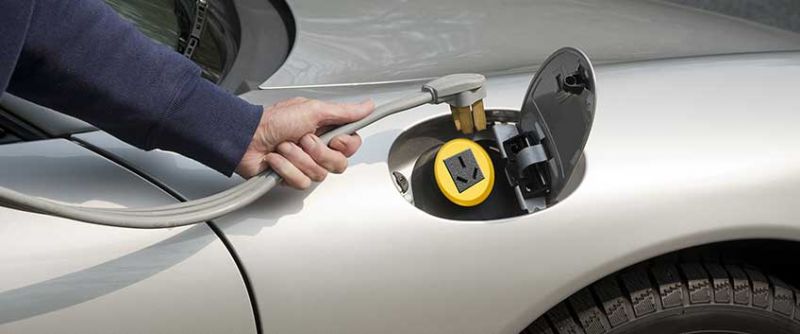While electric cars are still not the most worldwide popular type of cars, despite the fact that electric cars and hybrids are slowly, but surely gaining more and more popularity, many people around the world already have a certain opinion and an attitude toward electric cars and how functional they are, etc. However, are these opinions based on true facts, or popular myths? Today we are going to discuss some of the most popular myths and true facts regarding electric cars and help you learn more about this type of vehicle that soon enough will not be perceived as the “car of the future” anymore!
Strangely enough, despite the fact that the contemporary concept of electric and hybrid cars make many people describe them as the “vehicles of the future”, electrically powered cars have, in fact, existed and been used long before the diesel and the petrol engines. Funny enough, the first cars ever used are electric, which makes the description of the contemporary electric cars as the ones of the cosmic future a bit too exaggerated! In 1828 is created a car with the electric charging system (batteries), which makes this electric car almost 60 years older than the first car with a petrol engine. Almost 2 centuries ago, people, creators and scientists used to believe that electricity is what is going to lead to the magnificent industrial progress of the future, while other technological alternatives used to be considered not progressive and powerful enough.
And here we are, 2 centuries later, being fascinated by these avant-garde electric cars of the future that people have been fascinated by many decades back. Not much progress despite the great amount of electricity used to achieve it, right?! However, 200 years back people didn’t know how to store the electric energy for too long and this has led to utilising the new back then alternatives of cars powered by fuels such as petrol and diesel. Electric cars quickly began losing their fame to just a handful of years back, when the concept is brought back, however in a much more effective and contemporary way. In comparison with the electric cars of the past, the electric cars of the “future”, or more like the present time, are powered by accumulators that are compact, powerful and reasonably priced enough.
Many people tend to think that electric cars are too dangerous. As an example, many people would mention the three big fires that have started in 2013 due to the Tesla Model S cars in the USA. The three accidents led to a lot of discussions dedicated to the topic of how safe it is to use a vehicle powered by electricity. However, facts are facts and despite the three fires mentioned above, in all situations, there are any accidents in the passenger's compartment and, thank God, there were no injured people. But does this mean that any time a big issue happens with the electric car, people would be that lucky?
To be honest, the fact that electric cars are still not widely popular on the roads, make this discussion a bit more exaggerated, while the three examples mentioned seem like enough to support the thesis that electric cars are very dangerous. In a comparison, there are many more examples of accidents happening with cars with an internal combustion engine. In fact, cars powered by methane and propane-butane are much more dangerous than the electric ones, while hydrogen propulsion powered cars are right at the top of the ranking of most dangerous cars.
However, a lot of controversies linked to the electric cars comes from the fact that despite created as an eco-friendly option to mediate the progress of decreasing the carbon footprint we humans leave on Earth, electric cars are surprisingly enough, not that nature-friendly. The controversy comes from the fact that instead of being powered by electricity from the main electric network, electric cars are powered by expensive batteries and accumulators. These batteries and accumulators are certainly made out of and storing a lot of heavy metals and heavy toxic materials.
Additionally, electric energy is created either in a thermal power plant or a nuclear power plant. When it comes to electric cars, the issue of recycling the batteries and storing them is pretty serious and very, very controversial. To this date, the human race has not discovered or invented a 100% reliable method for a total neutralisation of the dangerous compounds. This is why the concept of electric cars only seems like a gesture to the environment.
Another widely spread myth about electric cars is that they are not speedy enough. This myth is more and more busted by the majority of the mass-market electric cars available. On the other hand, it is a subject of more discussions whether or not the powerful engine could be matched to a suitable battery or accumulator. The electric car models available on the market nowadays are combining the best alternatives available – a good speed with a good run is ensured by one charge only. The mileage could be much longer, however, the abilities of the car are limited electronically.
Finally, a bit of discussion about electric cars and the different seasons. Many people do think that electric cars are practically useless in wintertime, thinking that the expensive batteries and the complex electronic system of the cars simply cannot survive in the low temperatures outside. However, this is not quite the truth! The truth is that, in fact, the majority of the electric cars’ batteries and accumulators could stop working, when the temperatures outside are too low, however warming them up and making them work again is not that difficult at all, which means that electric cars are definitely not useless in wintertime. However, it is important to acknowledge the fact that the majority of the electric cars have a twice lower run with one charge in wintertime.
